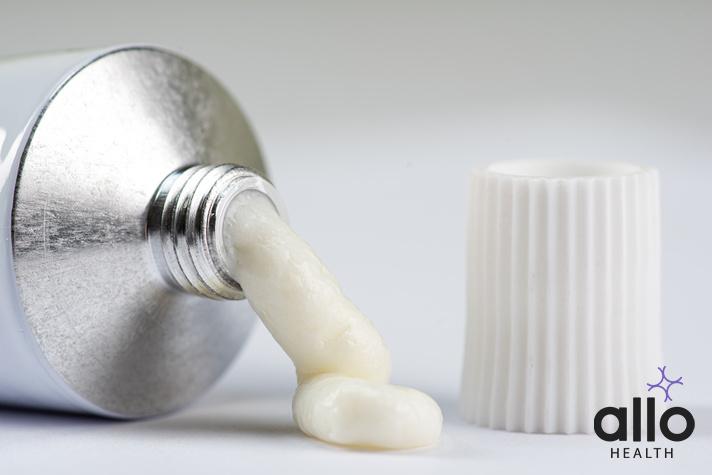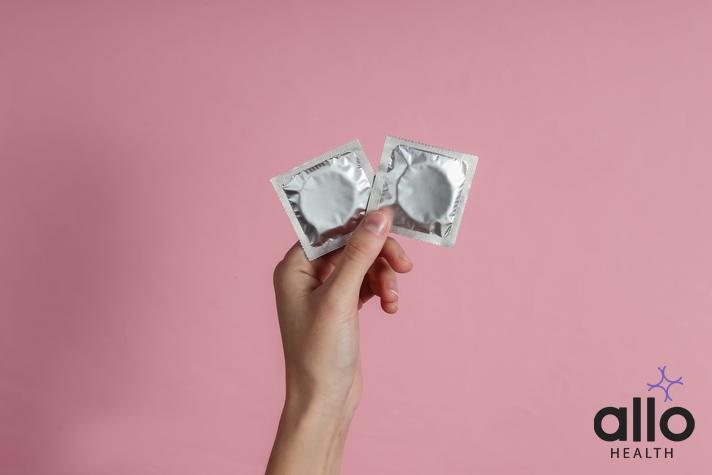Numbing Cream for Penis: Its Use and Effects

Allo Health is dedicated to personalized well-being, offering support and trusted information tailored to individual health goals. The platform emphasizes human-generated content, led by a distinguished medical team of experts, including physicians and sexual health specialists. Their commitment to credibility involves rigorous fact-checking, authoritative research, and continuous updates to ensure accurate, up-to-date information. Allo Health's unique approach goes beyond conventional platforms, providing expert-led insights and a continuous commitment to excellence, with user feedback playing a crucial role in shaping the platform's authoritative voice.

Dr. Aditi completed her undergraduate medical education at AJIMS, Mangalore, after which she worked in multi-speciality hospitals with COVID patients and in the Pain and Palliative medicine department. Driven by her experiences, she developed a keen interest in psychiatry. Dr. Aditi believes that mental health is just as, if not more important, than physical health.
Why This Was Upated?
Our experts continually monitor the health and wellness space, and we update our articles when new information became available.
Updated on 24 January, 2024
- Article was updated as part of our commitment to diversity, equity, and inclusion.

"The following blog article may discuss medical treatments and interventions. However, it is important to note that the information provided is for general educational purposes only and should not be considered as a substitute for professional medical advice, diagnosis, or treatment. Always seek the guidance of a qualified healthcare professional for personalized medical advice.
Book consultation
Medical treatments are complex and should be tailored to individual circumstances. The information presented in this blog may not be applicable to everyone, as each person's medical condition, history, and needs are unique. Only a qualified healthcare professional can evaluate your specific medical situation, consider relevant factors, and provide appropriate recommendations for diagnosis, treatment options, and monitoring.
It is crucial to note that self-diagnosis, self-medication, or relying solely on the information provided in this blog for treatment decisions can have serious health consequences. "
Numbing creams for the penis are often considered for managing conditions like premature ejaculation. These creams can be an effective treatment option, but it’s essential to understand their proper use, potential side effects, and alternatives. In this article we’ll know more about the mechanism, side effects and considerations of numbing cream for penis.
What does Numbing Cream for Penis?
Numbing cream for the penis is a topical product used to reduce sensitivity in the genital area. Its primary purpose is often to help manage premature ejaculation, a condition where a man ejaculates sooner during sexual activity than he or his partner would like.
Key Characteristics:
- Contains Anesthetics: These creams usually contain local anesthetics like lidocaine or benzocaine.
- Reduces Sensitivity: By dulling nerve endings in the penis, the cream lessens sexual sensation, which can help delay ejaculation.
- Temporary Effect: The numbing effect is temporary and typically lasts for a short period during sexual activity.
Usage:
- Applied Before Sex: The cream is applied to the penis a short time before sexual intercourse.
- Dosage Control: Only a small, pea-sized amount is usually needed.
Important Considerations:
- Not a Cure: It’s a temporary solution for premature ejaculation, not a cure.
- Potential Side Effects: Some men may experience side effects like mild skin irritation or allergic reactions.
- Consult Healthcare Providers: It’s advised to consult with a healthcare provider before using such creams, especially if there are underlying health concerns or other medications being taken.
Numbing cream for the penis is used as a temporary measure to decrease sensitivity and delay ejaculation, helping to manage premature ejaculation. However, its use should be carefully considered, ideally under the guidance of a healthcare professional.
What is Premature Ejaculation?
Premature ejaculation (PE) is a common sexual health condition where a man ejaculates earlier during sexual intercourse than he or his partner would prefer. This often means that ejaculation occurs with minimal sexual stimulation and sooner than the man wishes, sometimes even before penetration or shortly thereafter.
PE can be influenced by various factors, including psychological concerns such as stress, anxiety, or depression, as well as biological factors like hormone levels, inflammation, or a reaction to certain medications. The condition can cause distress, frustration, and a decrease in sexual confidence for both the individual and their partner, often affecting the overall quality of their sexual relationship.
Mechanism of Action
Numbing creams, also known as topical anesthetics, work by temporarily dulling the sensitivity of nerve endings in the skin. Their primary mechanism of action involves the active substances like lidocaine or benzocaine, which are commonly found in these creams. Here’s a closer look at how these ingredients function:
- Block Nerve Signals: Lidocaine and benzocaine, the key active substances in numbing creams, function by blocking the nerve signals in the skin. This action prevents the nerves from sending pain and sensitivity signals to the brain, leading to a numbing effect.
- Application on Intact Skin: For effectiveness, these creams are applied to intact skin, meaning skin that is not damaged or irritated. This ensures that the medication can work effectively without causing adverse reactions on sensitive or damaged areas.
- Has Temporary Effect: The numbing effect is temporary, as the medication only temporarily alters the function of the nerve endings. This is why these creams are used shortly before activities like sexual intercourse or surgical procedures to provide short-term relief from sensitivity or discomfort.
- Penetration into Skin Layers: Once applied, the cream penetrates the outer layers of the skin, reaching the nerve endings. This is why a pea-sized amount is often recommended, to ensure sufficient coverage without over-application, which could lead to excess absorption and potential side effects.
- Use in Sexual Activity: In the context of sexual encounters, particularly for men experiencing premature ejaculation, these creams help by reducing penile sensitivity. This can prolong the duration of sexual intercourse by delaying ejaculation.
- Caution with Overuse: It’s important to use these creams as directed, usually in small amounts, to avoid adverse effects like skin irritations or an allergic reaction. Overuse or applying a larger amount than recommended can lead to serious concerns, including adverse reactions to lidocaine or other components.
Numbing creams act by temporarily blocking nerve signals in the skin, reducing sensitivity and discomfort. Their use, particularly in sexual activity for conditions like premature ejaculation, should be carefully managed to avoid potential side effects. Always consult with healthcare providers or qualified doctors for guidance on using these numbing medications, especially if there are underlying medical conditions or concerns about adverse effects.
Common Side Effects and Risks

The common side effects and risks associated with the use of numbing creams, particularly those used for treating penis sensitivity and premature ejaculation, include several factors:
- Skin Irritations: Users may experience mild burning, itching, or skin irritations after applying the cream. This is a relatively common side effect, especially if the skin is sensitive.
- Allergic Reactions: There is a risk of allergic reactions to the active substances in the cream, such as lidocaine or benzocaine. Signs of an allergic reaction can include redness, swelling, and in severe cases, shortness of breath or anaphylactic reactions.
- Adverse Reaction to Lidocaine: Some individuals may have an adverse reaction to lidocaine, one of the common active ingredients in these creams. Symptoms can range from localized discomfort to more serious effects like blurred vision, sudden dizziness, or an increase in heart rate.
- Excess Cream Application: Using larger amounts of the cream than recommended can significantly increase the risk of side effects. Excess application can lead to more severe skin reactions or systemic effects due to increased absorption of the active ingredients.
- Potential Side Effects on Sexual Experience: Overuse or incorrect application of the cream can sometimes lead to a decrease in sexual pleasure, both for the user and their partner, due to reduced penile sensitivity.
- Cream Transfer Risks: There is a possibility of the cream transferring to a partner during sexual activity, which could numb their genital area as well.
- Interaction with Other Medications: Numbing creams may interact with other medications, including certain over-the-counter medicines and recreational drugs, potentially leading to adverse effects.
- Use with Latex Condoms: Some numbing creams can degrade latex, which is a material commonly used in condoms. This can increase the risk of condom breakage during sexual intercourse.
- Patient with Certain Medical Conditions and Sensitivity Levels: Individuals with certain medical conditions or those who have heightened sensitivity levels may experience more pronounced side effects.
- Emergency Medical Situations: In rare cases, the use of numbing cream can lead to medical emergencies, especially if there is an allergic or adverse reaction requiring immediate medical attention.
It’s important to use these creams as directed and consult with a healthcare provider or a qualified doctor before starting treatment, especially if you have existing medical conditions or are using other medications.
Considerations for Safe Use of Numbing Cream for Penis
When using numbing creams for penis sensitivity and premature ejaculation treatment, certain considerations ensure safety and effectiveness. It’s important to be aware of the potential side effects and how to use these products correctly.
Consult a Qualified Doctors
Before using any numbing medication, especially for sexual activity, consult with a healthcare provider or licensed physician. This is crucial for individuals with underlying medical conditions like high blood pressure, erectile dysfunction, or those taking medications like recreational drugs or blood pressure medication.
Correct Application
- Pea-Sized Amount: Apply only a small, pea-sized amount of the cream.
- Timing: Use the cream about 20-30 minutes before engaging in sexual intercourse.
- Avoid Excess Cream: Using larger amounts than recommended can increase the risk of adverse effects.
Skin Health
- Intact Skin: Apply the cream only to healthy skin. Avoid application on damaged or irritated skin to prevent complications.
- Mild Burning Sensation: Be aware that some creams may cause a mild burning or tingling sensation upon application.
Allergic Reactions
- Look out for signs of an allergic reaction, such as redness, swelling, or shortness of breath. If these occur, seek immediate medical attention.
- Test for Sensitivity: To prevent allergic reactions, test the cream on a small area of the skin before full application.
Compatibility with Latex Condoms

- Ensure that the numbing cream is compatible with latex condoms. Some creams can degrade latex, reducing the effectiveness of condoms in preventing STDs and pregnancy.
Emergency Medical Considerations
- Be prepared to seek emergency medical help in case of an adverse reaction, such as severe allergic reactions, blurred vision, sudden dizziness, or shortness of breath.
Avoid Combination with Other Medications
- Do not combine the use of numbing creams with other anesthetic medications or topical medications without consulting a healthcare provider.
Follow Medical Advice
- Always follow the advice of healthcare professionals regarding the use of over-the-counter medicines, prescription numbing products, and their potential side effects.
Be Aware of Adverse Effects
- Understand the potential adverse effects and side effects, including sensitivity levels to the active substances like lidocaine or benzocaine in the cream.
By following these considerations, users can minimize risks and ensure a safer experience with numbing creams for penis sensitivity and premature ejaculation.
Conclusion
Numbing creams can be a viable option for managing premature ejaculation. However, it’s crucial to use them correctly and be aware of potential side effects. Consulting with healthcare professionals and considering all available treatment options will ensure a safe and satisfying sexual experience.
Most Asked Questions
-
What exactly does a numbing cream for the penis do?
Numbing cream for the penis contains special ingredients like lidocaine or benzocaine that help reduce the feeling in the skin of the penis. This can help men who experience premature ejaculation by delaying it. Essentially, it makes the penis less sensitive during sexual activity.
-
How do I use numbing cream correctly and safely?
To use numbing cream safely, apply a small, pea-sized amount on the penis, typically 20-30 minutes before engaging in sexual activity. It’s important not to use too much and to avoid applying it on damaged or irritated skin. If you’re using a condom, make sure the cream is compatible with it, especially if it’s a latex condom.
-
Are there any side effects of using numbing cream on the penis?
Yes, there can be side effects. Some common ones include mild burning or itching sensation on the skin. In rare cases, there might be more serious reactions like allergic responses, marked by redness, swelling, or even difficulty breathing. If you experience any severe side effects, it’s crucial to seek medical attention immediately.
-
Can I get numbing cream for my penis without a prescription?
Yes, many numbing creams are available over the counter, which means you can buy them without a prescription. However, it’s a good idea to talk to a healthcare provider or a qualified doctor first, especially if you have other medical conditions or are taking other medications. They can help you choose the right product and provide guidance on how to use it safely.






































